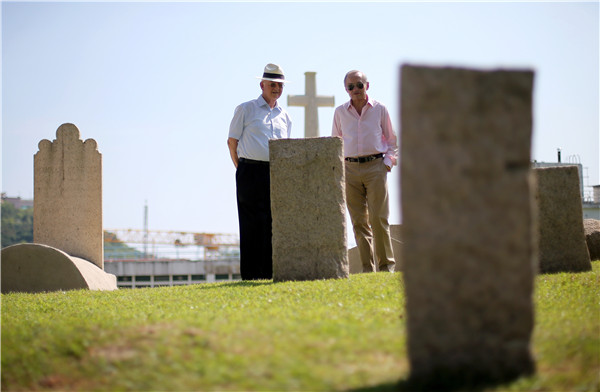Born in captivity, raised in freedom
Updated: 2015-08-27 07:36
By Chitralekha Basu(China Daily)
|
|||||||||||
Sharing and caring
Cautherley was born at Tweed Bay Hospital in the camp as a typhoon raged. His mother was anemic and had malaria when she gave birth. She required a blood transfusion and special care, which the sparse facilities at Tweed Bay could barely provide. One of the reasons she pulled through was because fellow inmates pitched in with post-natal care and helped babysit her infant son.
One of young Cautherley's minders was 19-year-old Mabel Redwood, who would sometimes push him around the cemetery in a pram. Mabel's older sister Barbara, who married Frank Anslow, a fellow internee, recorded the birth of "Baby Cautherley" in her diary. Today, Barbara Anslow is the point person for anyone looking for information on the history of the Stanley Internment Camp.
It's a theme she is ever ready to talk about. On the phone from her home in Essex, England, the spirited 96-year-old said internement was the first time many British people had met expats from outside their own communities - US nationals, Dutch and Eurasians. "Internment with different nationalities gave me a much wider view of human society than I had before," Anslow said.
She doesn't remember the Japanese warders as particularly barbaric, soulless monsters, as they appear in most war narratives. "We didn't see much of Japanese brutality at the camp, only heard about it," Anslow said. "Personally, I didn't have any dreadful experiences with the Japanese. I guess it is harder for people who did to forget. After the war we found that our camp wasn't as difficult as many others in the Far East, so we had reason to be grateful for that."
Clarke would probably agree. He remembers being told by his mother, who was ill during most of her stay at the camp, that she was "very well-treated by one of the Japanese soldiers. The man would smuggle rations for her."
Cautherley, too, has a curious about Japanese soldiers, was told to him by fellow internee Bill Macaulay, who was drawing a pension from the British Army at age 12 for supplying information. One day Cautherley noticed a couple of Japanese officers marching up the slope. Following in their footsteps was a pint-sized human, imitating their gait. Macaulay was terrified of the consequences, in case the soldiers noticed the little mimic. When they did turn around, the officers, far from seeing the act as an insult, seemed greatly amused. Macaulay grabbed the impetuous young Cautherley, for it had been he who was having a go at playing "army guy", and rushed him to his mother before the officers could change their minds.
Today's Top News
11 under investigation and 12 detained over Tianjin explosions
Born in captivity, raised in freedom
Hungary scrambles to confront migrant influx
Suspect in Virginia TV shooting had history of workplace issues
Too hard to say goodbye to Tibet: China's Jane Goodall
Bank lowers lending rate to ease debts
Black Monday brings focus onto China's markets, currency
Two US TV journalists shot dead
on air
Hot Topics
Lunar probe , China growth forecasts, Emission rules get tougher, China seen through 'colored lens', International board,
Editor's Picks

|

|

|

|

|

|







